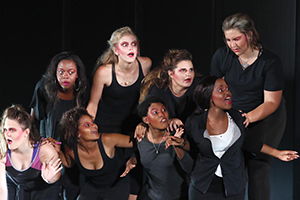
This year, the ladies from Roosmaryn and Sonnedou
walked away as the Stagedoor winners.
Photo: Johan Roux
This year, the first-years gave a show-stopping performance as they showed the audience how to make Stagedoor great again.
Hard work and sacrifice pays off
Let’s make Stagedoor great again was the theme behind this year’s Stagedoor production, which allowed all residences to get their creative juices flowing by bringing the theme to life in their own unique way.
Divine Bitalo, Roosmaryn RC Culture, said that they are honoured to have been crowned as the champions. “We put in a lot of hard work and sacrifice and we are just glad that everything worked out in the end.”
First-years given amazing platform
Teneal van Deventer, Sonnedou RC Culture, concurred with the words of Divine and also thanked the university for the opportunity. “I would like to thank Kovsies for giving our first-years this amazing platform to showcase their talents and make new friends.”
The Stagedoor finals, which took place on Saturday 4 March at Kovsie Church, saw our first-years battle it out to be crowned as this year’s winners and claiming the bragging rights for the year.
The winners were:
1st place: Roosmaryn and Sonnedou
2nd place: BeyCon (Beyers Naude and Conlaures)
3rd place: Marjolein and Legatum